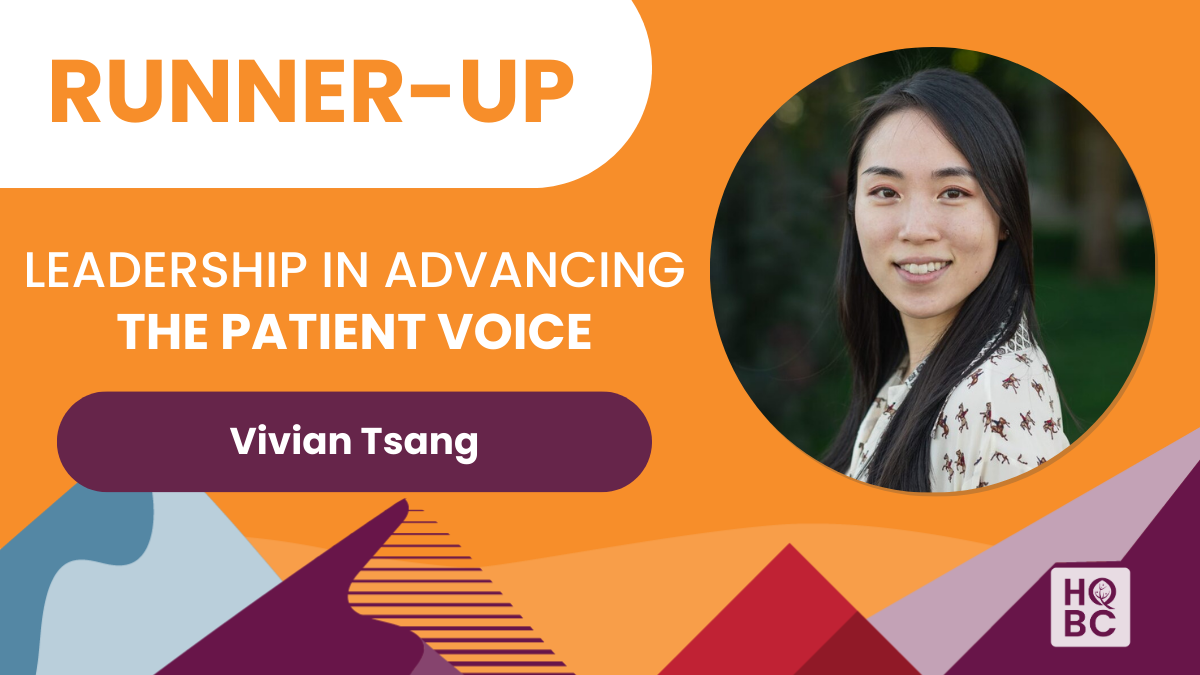- 2024
|
- Runner-Up
|
- Leadership in Advancing the Patient Voice
Vivian Tsang began her journey in health care as a soft-spoken 16-year-old, participating as a patient partner in a research study at BC Children’s Hospital. A decade later, and now a physician, she’s making her voice heard as an advocate for youth advisory voices in research.
“Although Dr. Tsang started this journey herself as a young patient, she has leveraged her story to inspire youth not only across this province, but across the country to take ownership of their health to participate in health care processes, and become the health care leaders of tomorrow,” says Georgia Simkin, a patient partner at KidsCan, a national patient-run program involving youth ages 13-19 advising on pediatric research, where Vivian is now national director.
Vivian first became involved in advancing the voice of patients in 2012 as a study participant in high school. Through this work, Vivian realized the value of including the voice of the patient in research. At that time, she noticed that this way of involving patients was still very much an exception, not the norm.
As Vivian continued as a volunteer, KidsCan ran out of its grant funding and was at risk of being dissolved. Passionate about continuing the work of KidsCan, Vivian, at that time a Grade 12 student, volunteered to run the group as a youth leader. KidsCan became a youth-led, young person’s research advisory group for improving the lives of young patients, by young patients. Its creation in 2012 was the first of its kind in the world.
Over the last decade, Vivian has dedicated thousands of hours of unpaid time and has organized and facilitated over 100 pediatric consultation sessions that enable young patients in BC to advise on upcoming and ongoing research projects. This includes training youth on what it means to become a patient partner, as well as training researchers on how to speak with young patients in a meaningful way.
She has liaised with various patient advocacy groups in BC and Canada to create a national program that is now sustainably housed within the Maternal Infant Child Youth Research Network (MICYRN). She successfully connected eight pediatric tertiary care hospitals in a novel pan-Canadian network – an instrumental resource for early-practice clinicians or those from low-resource communities wishing to acquire research funding. Through this work, she paved the way for the expected engagement of young patients in pediatric research in BC.
She also has provided advice on the development of various patient engagement programs such as the Canadian Institute of Health Research’s Strategies for Patient Oriented Research as well as the BC Support for People & Patient-Oriented Research and Trials (SUPPORT) Unit.
Through KidsCan, Vivian witnessed how empowerment can change the lives of pediatric patients and, in 2014, was one of the cofounding members, along with a similar young persons’ research advisory group from Connecticut, of the International Children’s Advisory Network (iCAN), now with some 38 teams in 15 different countries. iCAN helps to connect Canadian initiatives with similar initiatives in Europe, America, and Asia. This innovative strategy has facilitated successful collaborations with Health Canada, the European Commission, and numerous public-private partnerships.
During her time, she has also helped various Canadian and BC-based research and hospital groups form and grow their own patient advisory groups. She has liaised with BC Children’s Hospital in the improvement of their hospital-based Youth Advisory Council. And she has helped to build the patient advisory team at the CHILD-BRIGHT Network, a platform for building patient-oriented child health research for brain-based disabilities in Canada.
“Now, Vivian has become Dr. Tsang, a physician whose ongoing work in KidsCan continues to be separate from her job and position in the medical community,” says Georgia of Vivian, who successfully went through medical school and is currently a psychiatry resident at UBC. “Dr. Tsang inspires leadership in the group of young patients she leads. As a past patient herself, Dr. Tsang has overcome many barriers to get to where she is now. Not only did she step up during a time of need to lead KidsCan and take on a significant leadership role, but she did so in the midst of all her studies and in the absence of compensation.
“This makes her a huge inspiration to many in the patient-oriented research community and the wider community of BC.”


